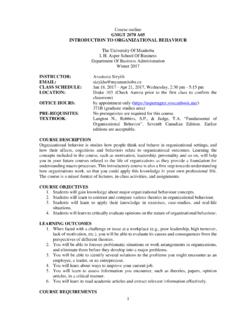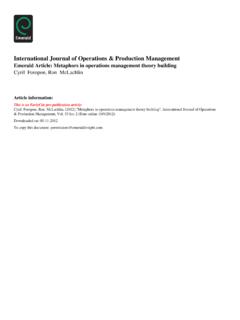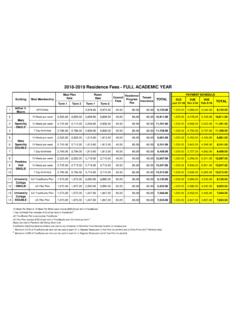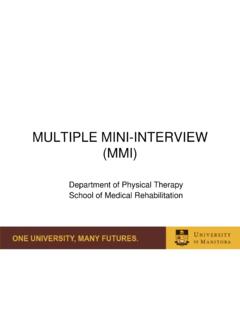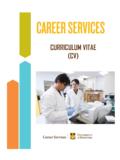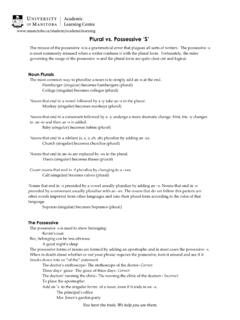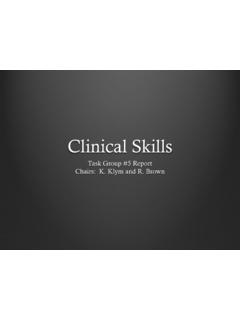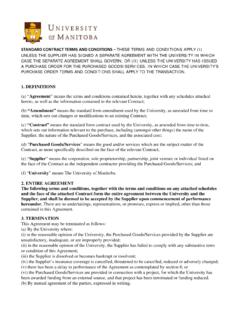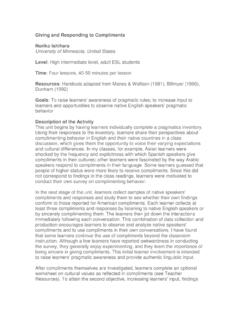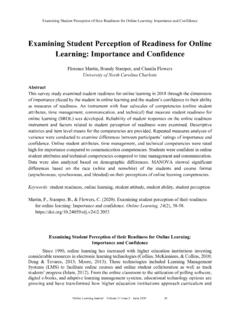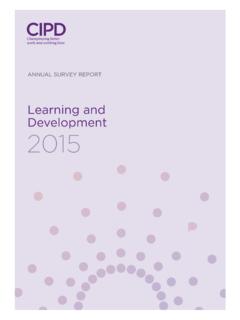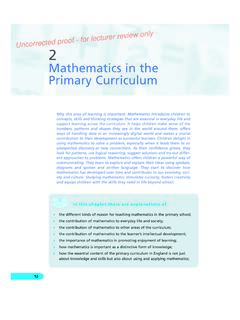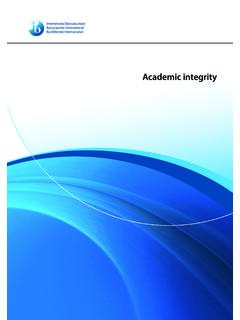Transcription of What is synthesis - University of Manitoba
1 Created by Cosette Taylor, Communications Instructor for the Faculty of Nursing at the University of Manitoba , What is synthesis ??? (consider reading What is analysis ??? before reading this document) SynthesisSynthesisSynthesisSynthesis means to combine a number of different pieces into a whole. synthesis is about concisely summarizing and linking different sources in order to review the literature on a topic, make recommendations, and connect your practice to the research. synthesis usually goes together with analysis because you break down a concept/idea into its important parts/points (analysis), so you can draw useful conclusions or make decisions about the topic or problem ( synthesis ). Examples of Examples of Examples of Examples of Analysis to Analysis to Analysis to Analysis to SynthesisSynthesisSynthesisSynthesis Research Question: What increases student motivation? One possible answer: meaningful work Analysis=One part or way of increasing student motivation is through meaningful work.
2 What did individual authors have to say about meaningful work? Author s Names meaningful work Knowles (1978) Builds upon learners life experiences, and links new knowledge with previous life experiences Seifert (2004) Contributes to confidence Rogers (2002) Tasks meet an immediate need Bandura (1997) Leads to task persistence Craft (2005) Reflective journals can be meaningful to the student What does the student author think? I also find that I am more motivated to do real life nursing tasks that are meaningful to my future career Created by Cosette Taylor, Communications Instructor for the Faculty of Nursing at the University of Manitoba , (Also see: What is analysis??? ) UnsuccessfulUnsuccessfulUnsuccessfulUnsu ccessful synthesis of the Research LiteratureSynthesis of the Research LiteratureSynthesis of the Research LiteratureSynthesis of the Research Literature Knowles (1978) wrote that meaningful work builds upon life experiences and links new knowledge with previous experiences.
3 Meaningful work contributes to a student s confidence (Bandura, 1997). Meaningful work meets an immediate need (Rogers, 2000). Seifert (2004) claimed that meaningful work contributes to a student s confidence . Finally, Craft (2005) stated that reflective journals can be meaningful tasks for the student. If you compare the table on the previous page to this synthesis , it becomes clear that this student writer is restating each author s ideas like a grocery shopping list. Although the APA citations are correct, the above synthesis is unsuccessful because the reader does not learn how these ideas are related or if some ideas are more significant than others, nor does the reader learn the writer s position on the subject. Successful Successful Successful Successful SSSS yyyynthesisnthesisnthesisnthesis of the of the of the of the RRRR esearch esearch esearch esearch LLLL iteratureiteratureiteratureiterature Much of the literature claims that student motivation increases when the tasks are meaningful (Bandura, 1997; Craft, 2005; Knowles, 1978; Rogers, 2000; Seifert, 2004).
4 1 The above synthesis reports a common finding of various authors While satisfying the professor s expectations can be satisfying for the student, meaningful work contributes to a student s confidence (Seifert, 2004) and persistence of a task (Bandura, 1997). Notice that this second synthesis combines the student s initial thought (satisfying a professor s expectations can be important) with information from the literature (the student s need for meaningful learning) For work to be meaningful to students, tasks should build upon their life experiences and link new knowledge with their previous life experiences (Knowles, 1978) or immediate needs (Rogers, 2002). One means of achieving a meaningful connection is through reflective journaling tasks (Craft, 2005). 1 Notice that multiple citations in the same (brackets) are listed in alphabetical order Created by Cosette Taylor, Communications Instructor for the Faculty of Nursing at the University of Manitoba , This third synthesis summarizes different kinds of findings.
5 The student has successfully synthesized the sources by concisely showing the reader how these different ideas fit together. Given the importance of meaningful learning in increasing student motivation and task persistence (Bandura, 1997; Craft, 2005; Rogers, 2000; Seifert, 2004), it is important to provide relevant and practical clinical teaching to clients. or Bandura (1997) and Rogers (2000) findings indicate that meaningful tasks are more likely lead to the completion of learning tasks or the fulfillment of a need. However, the learning process itself is more enjoyable when the task is important to the learner. Nurses should take both the learning process and learning outcome into consideration. Reflective assignments require you go beyond a synthesis of the literature. For some assignments, you need to make recommendations or form conclusions based on your analysis and synthesis of the literature.
6 Notice how the student has combined his or her thoughts with the research without using I think , I believe , or this student argues While some researchers (Bandura, 1997; Rogers, 2002; Seifert, 2004) define the benefits of meaningful work for students in general, the existing literature does not explore the advantages of meaningful work for high school students or adolescents specifically. A synthesis should not only show what the research tells us; a synthesis should also identify what the research does not tell us. In other words, what are the holes , gaps , or unknowns in the research on this topic? SynthesisSynthesisSynthesisSynthesis DeterminesDeterminesDeterminesDetermines Which sources overlap or share the same opinion/findings? Have you found any common traits or themes in the research literature? What choice have you made about this dilemma? Why did you make that choice and not another?
7 What meaning or conclusions do you draw from the data on this topic? How might that new meaning change or reinforce your practice? Why is the piece of research evidence weak or strong? Using the statistics, facts, or knowledge in the research, what kind of story have you crafted for the reader? What is your angle or your personal interpretation of the evidence? How have you shown the reader which parts of the argument (or which pieces of research) are most useful or most important?
